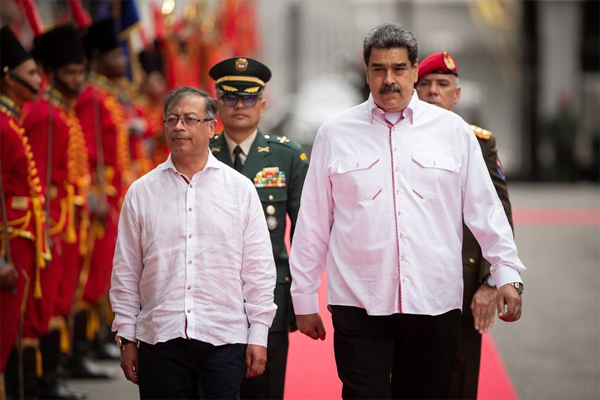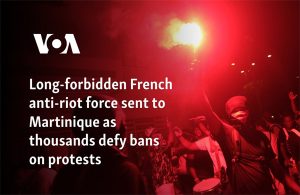
Kejal Vyas, WSJ
BOGOTÁ
EnergiesNet.com 11 02 2022
The leaders of Colombia and Venezuela met Tuesday for the first time in six years, the latest sign of how new leftist governments in Latin America are breaking from a U.S.-led campaign that unsuccessfully sought to oust Venezuela’s authoritarian President Nicolás Maduro.
Colombian President Gustavo Petro, a former guerrilla who once held close ties to Venezuela’s ruling Socialist Party, traveled to Caracas to have lunch with Mr. Maduro and discuss bilateral trade and the bolster of regional environmental-protection efforts. Mr. Petro said he also called on Mr. Maduro to commit to promoting democracy in the region and ending political persecution.
The meeting comes weeks after both countries restored diplomatic relations and reopened their long-closed border.

Countries across the Americas are considering how to approach Venezuela’s political stalemate and economic collapse that has led more than seven million Venezuelans to leave the country during Mr. Maduro’s tenure. The Biden administration says it is working to encourage negotiations between Mr. Maduro and the opposition to set a timeline for presidential elections, moving away from a Trump-era policy of economic sanctions.
Venezuelan state television called it a historic moment as Messrs. Petro and Maduro, both dressed in white ceremonial shirts, smiled and walked side-by-side into the Miraflores presidential palace. One top Maduro aide called it a “meeting of love.”
“It’s been a fruitful first meeting,” Mr. Maduro said in a news conference. Mr. Petro added that the neighboring nations’ “brotherhood should have never been broken,” referring to his predecessor who allied with the U.S. in an effort to unseat Mr. Maduro.
Mr. Petro’s visit is a nod to Mr. Maduro after Colombia and dozens of other U.S. allies had deemed the leader illegitimate for alleged election rigging and dissolving congress. But now with friendlier governments in the region, Maduro allies see the possibility that international pressure may ease.
Mr. Maduro applauded Mr. Petro’s electoral victory in June. On Sunday, many of his supporters also celebrated the triumph of Brazil President-elect Luiz Inácio Lula da Silva, whose Workers’ Party has supported the Maduro government.
“Imagine that, a summit with Petro, Lula, Maduro,” said Diosdado Cabello, a senior leader in Venezuela’s Socialist Party. “That’s going to give hives to a lot of people.”

Venezuela was once a pillar of a so-called Pink Tide of leftist governments around Latin America, but its reputation has been soiled by allegations of human-rights abuses and corruption, as well as the demise of an oil-rich economy that had once showered regional ideological allies with cheap loans and political contributions, said Venezuelan political activist Jesús Torrealba.
“The Latin American left used to line up to come to events in Caracas, especially for oil interests,” Mr. Torrealba said. “Today, Maduro’s regime is a weakness for the continental left.”
Juan Guaidó, the Venezuelan congressional leader who the U.S. recognizes as the country’s legitimate president, said Mr. Petro’s visit “could dangerously normalize human rights violations” in Venezuela.
In September, a United Nations committee said in a report that it found ample evidence that the Venezuelan government committed crimes against humanity to crush dissent, detailing how Mr. Maduro and his top aides have been personally involved in ordering the arrests and torture of their adversaries.
A bipartisan delegation of U.S. senators on the Foreign Relations Committee told reporters in Bogotá recently that they expressed to Mr. Petro their concerns over negotiating with Mr. Maduro given his record on human rights. But they also said they discussed the Petro administration’s potential role in helping to bring Mr. Maduro back to talks with his political rivals.
“Look, I hope this can be successful. Nothing else has worked,” said Sen. Rob Portman (R., Ohio). “But I’m very skeptical as well.”
Mr. Petro’s diplomatic endeavor underscores the challenges ahead for engagement with Caracas.
Mr. Petro has expressed frustration that merely $2 million in formal commerce had been logged since Colombia and Venezuela reopened their border in September. The porous, 1,300-mile-long border is rife with smugglers and armed criminal groups, he said. The Petro government says it wants Mr. Maduro to help with peace talks with Colombian rebel groups that have long found haven in Venezuela.

Direct flights between the neighboring nations haven’t been able to restart, largely because U.S. sanctions against Venezuela’s state airline prohibit Colombian companies from doing business with the carrier, according to Colombian officials.
Former Colombian Vice President Francisco Santos doubted much good would come of the meeting, saying Mr. Maduro has little incentive to cede ground after weathering international pressure. “The chances of having fair elections in Venezuela are practically zero,” Mr. Santos said.
Juan Forero contributed to this article.
Write to Kejal Vyas at kejal.vyas@wsj.com
wjj.com 11 01 2022









